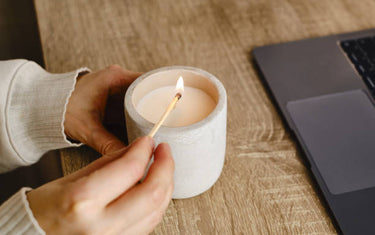5 min read / 6 July 2025 / yasmin sharp
Memory, Scent, and Essential Oils: How Smell is Tied to Memory
Discover the fascinating connection between scent and memory, examining scientific research on how essential oils like peppermint, rosemary, and lavender may enhance cognitive function and memory retention.
Share this post

Some people believe that essential oils and memory go hand-in-hand, as scents can affect our brains in different ways, whether it’s on an emotional, behavioural or cognitive level.
Our brains are wired to interact directly with scents and aromas, and over time, smell has evolved to play a vital role in our evolutionary history.
From using peppermint oil for concentration to inhaling rosemary for memory enhancement, we look at some of the claims to see if essential oils can be beneficial to our brains.
How are smell and memory linked?
When we inhale a scent, the aroma heads directly to the olfactory nerve in the brain.
This is unusual because the senses that dictate our hearing, sight, touch and taste head in a different direction, travelling to a part of the brain called the thalamus, which serves as our data processing centre to help us understand our minute-by-minute interactions.
The olfactory nerve is connected to both the hippocampus and amygdala parts of the brain, which are responsible for helping us to form new memories and deal with emotion, fear and motivation.
This direct gateway between scents and our brains could explain why certain aromas act as triggers to spark memories and emotions.
Some estimate that as much as 75% of our daily emotions are generated through what we smell, although the scientific data to back up such a claim is lacking at present.

Can inhaling scents help your memory?
Research into how scents affect our brains is ongoing, as scientists continue to learn more about how our bodies and organs respond to certain fragrances and smells.
For example, a study conducted by the University of California suggested that inhaling certain essential oil scents during sleep could help to boost memory. [1]
43 men and women aged between 60 and 85 were split into a control group and an exposed group.
Every night for 2 hours over a 6-month period, the exposed group were asked to use a diffuser to release a different essential oil for two hours.
Researchers concluded that being exposed to a small amount of scent helped to improve brain functioning, potentially making it an effective and low-effort way to boost memory.
This could occur because of the direct links between our olfactory system (sense of smell) and the limbic system (parts of the brain responsible for behavioural and emotional responses, as well as memory). [2]
A separate study in Germany found that participants had improved retention when they were exposed to the same scent during sleep they had inhaled whilst studying.
Although wide scale clinical trials are needed to understand if this could be harnessed into some form of medical treatment, the initial findings certainly sound promising.
How to use essential oils for memory
Whilst there are several scientific studies focussed on essential oils and memory, you can also incorporate some of these ideas quite easily into your daily routine.
Everyone responds differently to scents, so there may be some trial and error involved, but at the very least you’ll be able to enjoy the aromatherapeutic benefits essential oils have to offer.
- Use a diffuser: Add a few drops of your preferred oil to a diffuser and leave it to disperse for 30–60-minute periods. You can do this before you go to bed or if you are preparing for an exam or test of some kind, leave it to work in the background as you study.
- Direct inhalation: This is more of a manual method, as it involves applying an essential oil to a tissue or handkerchief and inhaling as and when you need. Alternatively, you could add a few drops to your pillow before bedtime, allowing you to inhale as you sleep.
- Add to clothing: If you don’t own a diffuser and prefer not to add a few drops of oil to your pillow, then you could use your own clothing instead. The inside of a collar or around the neckline will allow the scent to naturally drift into your nasal passage. If the oil is likely to come into contact with your skin, be sure to carry out a patch test to ensure it doesn’t cause any irritations or allergic responses.

What is the best essential oil for memory?
Depending on your scent preference, you could try the following to boost your memory and concentration levels.
Peppermint oil helped to boost learning ability in mice
Some people use peppermint oil for concentration as part of their exam preparation or to generally support their retention skills.
Researchers conducting animal studies found that peppermint oil may have the potential to protect neurons in animal brains, whilst also boosting the balance of antioxidants and free radicals in their bodies. [3]
They concluded that sniffing peppermint oil helped to improve learning and memory ability of the mice used in the tests. However, no humans were involved in this research model.
Rosemary oil improved the cognitive ability of lab animals
Current studies on essential oils and the brain continue to examine the effectiveness of using rosemary for memory.
For example, a review of animal studies found that cognition in lab animals was significantly improved when exposed to the scent, including those with memory deficits. [4]
Separate research found that there could be benefits to using rosemary oil for memory and mood enhancement, possibly to the presence of a compound called 1,8-cineole. [5]
Lavender oil could support concentration and cognitive function
Lavender oil is often recommended to improve sleep quality, although research results have its ability to boost memory have been mixed.
While a review of studies suggested that certain aspects of cognition could be improved by inhaling lavender oil, other studies have found that memory and reaction time were decreased after exposure to the scent. [6] [7]
Electrical brain activity was monitored by scientists in another study centred on the effects on lavender oil, which came to the conclusion that it may improve concentration and cognitive flexibility. [8]

Final thoughts
Scents and aromas can act as a trigger for remembering old memories, so it follows that they could also impact our ability to concentrate and recall information.
There is no solid scientific consensus on the topic, as many of the studies that included essential oils have been too small, so more research is needed to understand the links.
On the other hand, essential oils can offer aromatherapeutic benefits for studying, focus, relaxation and mood enhancement so there are plenty of ways you can use their scents to your advantage.
[1] Cynthia C. Woo et al. (2023) Overnight olfactory enrichment using an odorant diffuser improves memory and modifies the uncinate fasciculus in older adults https://www.frontiersin.org/journals/neuroscience/articles/10.3389/fnins.2023.1200448/full
[2] Franziska Neumann et al. (2020) How odor cues help to optimize learning during sleep in a real life-setting https://www.nature.com/articles/s41598-020-57613-7
[3] Xiaofan Lv et al. (2022) Effects of Peppermint Essential Oil on Learning and Memory Ability in APP/PS1 Transgenic Mice https://www.mdpi.com/1420-3049/27/7/2051
[4] S M Hussain et al. (2022) Cognition enhancing effect of rosemary (Rosmarinus officinalis L.) in lab animal studies: a systematic review and meta-analysis https://pubmed.ncbi.nlm.nih.gov/35170682/
[5] Mark Moss and Lorraine Oliver (2012) Plasma 1,8-cineole correlates with cognitive performance following exposure to rosemary essential oil aroma https://pmc.ncbi.nlm.nih.gov/articles/PMC3736918/
[6] Eleonora Malloggi et al. (2021) Lavender aromatherapy: A systematic review from essential oil quality and administration methods to cognitive enhancing effects https://pubmed.ncbi.nlm.nih.gov/34611999/
[7] Mark Moss at al. (2003) Aromas of rosemary and lavender essential oils differentially affect cognition and mood in healthy adults https://pubmed.ncbi.nlm.nih.gov/12690999/
[8] Afghan, Reyhaneh et al. (2024) Lavender Essential Oil Inhalation Improves Attentional Shifting and Accuracy: Evidence from Dynamic Changes of Cognitive Flexibility and Power Spectral Density of Electroencephalogram Signals https://journals.lww.com/jmss/fulltext/2024/04180/lavender_essential_oil_inhalation_improves.3.aspx










